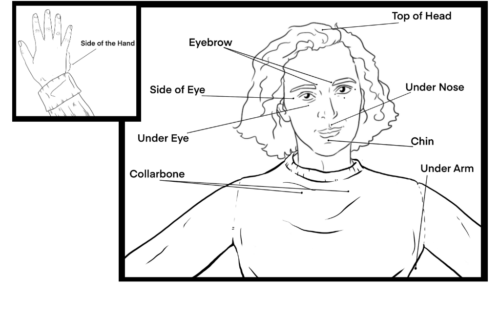
Is Tapping Therapy?
WHAT’S THE ISSUE: Tapping isn’t therapy, right? It depends. Tapping/EFT can be therapy. But it can also be a self-care personal practice. Tapping meditations are a body based stress management practice.
You can also apply it as a Mental Health First-Aid tool. Silent Tapping continuously is one example. Another way you can apply EFT is by integrating it into a classroom or training environment as a memory-booster and learning enhancer. For example, a learner can tap before or during an exam. Or a teacher can integrate a 2 minute tapping activity into the school day to help their students concentrate.
There are various techniques in clinical EFT Tapping and different ways of applying them depending on the purpose and context. In a nutshell, tapping is a collection of stress management techniques that have more applications than just for therapy.
HOW TAPPING THERAPY DIFFERS FROM TAPPING MEDITATIONS
“For decades, research has consistently shown that the therapeutic relationship plays the most important role in whether and how therapy works (Norcross and Lambert, 2011, 2018; Lambert, 1992). Its impact is only second to extra-therapeutic client’s characteristics (e.g., resilience, social support) and greater than the specific “techniques” that are used by the therapist.
This is not to say that different therapy approaches make no difference. However, whatever happens in therapy—the use of any theory, intervention, or technique—happens in a relational context, the relationship between therapist and client, and it is that context that makes the most difference.”
S. Delboy (2024) Psychology Today
An important criteria for tapping to be therapy is that it needs to occur in the broader context of a therapeutic relationship. As humans, we all have blind spots. We can all only go so far alone. Even as a certified Advanced EFT Practitioner, I still invest in tapping therapy with EFT Practitioners who have more experience than me. I know that independent self-care tapping is not the same as tapping therapy. I also know that transformation happens within the context of a relationship. Tapping meditations and tapping for self-care are great relievers, but they can’t really facilitate meaningful change.
If you practice Silent Tapping (tapping without words) for 2-10 minutes a day, it can have therapeutic benefits – assuming that you tap every day for 3-8 weeks. Tapping meditations fall under the umbrella of body-based mindfulness practices. But that’s not therapy. That’s self-care. It’s a healthy habit, an application of EFT for proactive emotional self-regulation and stress management. Our emotional hygiene habits matter, and tapping is a great way to take care of our emotional hygiene.
Tapping in the context of a therapeutic relationship adds depth and breadth of outcomes compared to just doing EFT meditations. It also depends on the skill level of the EFT Practitioner who you are tapping with. Giving yourself a foot massage won’t have the same depth of outcomes as receiving a therapeutic massage with a skilled professional. The same is true for tapping.
On a basic level, tapping meditations can provide some relief from an intense emotion or from the stress component of physical pain. However, you’re probably not going to be able to clear the root of a problem if you are only tapping all on your own, particularly if it’s a more complex issue.
There are countless research papers evidencing the effectiveness of clinical EFT Tapping techniques for a range of issues. However, you’re unlikely to reap the full benefits of the kinds of results these research papers talk about if all you ever do is tap on your own. Unless you have resistance, you will probably experience relief from tapping on your own, in the moment. You can go further faster when you are working 1-to-1 with a skilled EFT Practitioner who you ‘click’ with, or when you are tapping within a closed group setting.
HOW TAPPING THERAPY DIFFERS FROM PSYCHOTHERAPY
One misunderstanding I’ve been coming across a lot lately is that tapping is psychotherapy. It seems as if that confusion comes from an assumption that all therapy is psychotherapy.
There is confusion around the terms Counsellor and Psychotherapist. People often use the words Counsellor and Psychotherapist interchangeably. And there is also some confusion around psychotherapy and therapeutic work. You don’t have to be a Counsellor or Psychotherapist to do therapeutic work. If a person is feeling stressed, they may choose to go to see a Counsellor or Psychotherapist for their stress. However, they may choose to go and see an EFT Practitioner who is accredited who can also help them therapeutically with their stress. Or they may choose to take a break and go away for a while on holiday. All of these choices are perfectly appropriate and can be deemed therapeutic.
If someone is a psychotherapist, essentially what that means is that they are offering some form of talk therapy services. There are hundreds of types of talk therapy, and they often combine more than one approach.
Some talk therapists incorporate other modalities, such as body-based therapeutic tapping protocols, into their work with clients. I’ve recently discovered a growing number of professionals here in Athens who specialize in what’s called Body Psychotherapy. This makes sense. Research in the field of psychological trauma, which up until recently has been shoved to the wayside in universities offering psychology degrees, is currently transforming the fields of psychology and psychotherapy. As a result, some psychotherapists are integrating tapping techniques like the Butterfly Hug and clinical EFT Tapping into their professional toolbox as part of their continued professional development journey.
Are you A THERAPIST?
When I’m working 1:1 with a client as an EFT Practitioner, I’m both a therapist and a coach. I offer what’s called therapeutic coaching. The two things don’t have to be mutually exclusive. I don’t just offer therapy, because I’m not just a therapist.
In my private practice, I bring together my coaching skills and my therapeutic skills as a certified Advanced EFT Practitioner with EFT International. EFT International is one of the world’s leading tapping training providers. I’m trained and qualified to work with kids and adults of all ages using tapping techniques for Inner Child wounds, as well as helping people process small ‘t’ trauma memories from childhood. In other words, I’m qualified to work with traumatic and posttraumatic stress symptoms.
As part of my work as a therapist, coach, and trainer, I receive monthly clinical support from a clinical supervisor in the UK as part of my Continued Professional Development (CPD) for my coaching and therapeutic skills as well as for my training skills.
When looking for an EFT Practitioner, you wanna make sure that the EFT Practitioner is an accredited Practitioner with a body like EFT International, Evidence-Based EFT or ACEP. This means that they will have met the criteria for competency and safe ethical practice. Also be aware, in order to be accredited, an EFT Practitioner has to maintain their accreditation by regular supervision/mentoring and Continued Professional Development.
Each EFT Practitioner has their own scope of practice. For example, someone like me who is not qualified to treat a diagnosed eating disorder like Bulimia can’t offer tapping services to treat someone’s Bulimia. That would be outside of our scope of practice. However, I can be part of a larger support team for a client who is receiving treatment for Bulimia.
A university student who is receiving treatment by professionals who specialize in treating Bulimia can do therapeutic coaching sessions with an EFT Practitioner specialized in anxiety and academic success for their exams, university assignments or dissertation.
Let me give you another example. A teenager who is receiving treatment for Anorexia with an appropriate mental health care professional can be seeing a Nutritionist for that part of their problem. They can also be seeing an EFT Practitioner for their poor academic self-esteem, habit of avoiding studying, or fear of failing their exams.
If you’d like to learn more about how I work as a therapeutic tapping coach, here are are some examples of real EFT therapy session, recorded and shared with consent:
- https://elenivardaki.com/changing-drinking-habits/
- https://elenivardaki.com/exam-stress-procrastination/
- https://elenivardaki.com/eft-for-phobias/
You’ll notice how I use my EFT skills to work therapeutically on the small ‘t’ trauma that emerged for each person as we worked together on clearing their inner blocks to them succeeding in achieving a specific goal.
WHAT MAKES SOMETHING THERAPY?
“People come back all the time from Syria and Afghanistan with pictures of kids drawing corpses. And they say ‘Look at the wonderful therapy I do’.”
I say ‘Where’s the therapy? They’re just drawing corpses. That’s what they have seen, but how do you help them?’ Cause you need to transform reality in terms of introducing new possibilities.”
Bessel van Der Kolk, Trauma2Therapy Conference, Sept 2023, Athens Greece
An intervention isn’t therapy if there is no measurable transformation – a ‘before’ and ‘after’. Talking about your problem isn’t therapy. Drawing your problem isn’t therapy. It’s just a record of your starting point. For something to be considered therapy it needs to involve “introducing new possibilities”. New possibilities for how you can be in the world. For who you can be in the world, and sometimes even for how the world can be. You can observe these transformations in a client’s words, emotions, thoughts, sensations, drawings, choices, or behavior patterns/habits.
Dr. Bessel van der Kolk raised awareness about this important criteria for what constitutes therapy in one of the training sessions he delivered here in Athens on September 14th 2023. He went on to give an example of therapy. We saw a series of pictures that clearly evidenced a teenage boy’s journey of inner transformation from anger and terror to the new possibility of feeling safe.
In tapping therapy, we may sometimes ask a client to draw how they feel before and after a tapping session as a way of identifying any transformations in their way of thinking in terms of new possibilities. But most of the time, we ask clients to measure the intensity of the negative emotion when they think about a particular issue or problem, both before, during, and at the end of a therapy session. There are also many other ways in which we test for progress. For example, we can measure how true a negative thought feels when they think about a past or future event.
Typically, when the intensity of the negative emotion reduces to a 3/10 or less, it’s quite common for a spontaneous ‘”transforming of reality to new possibilities” to occur naturally. In EFT, we call that a Client Cognitive Reframe. In other words, the client’s brain reframes the way they think about a situation without the EFT coach or EFT therapist needing to intervene and do it for them.
DO YOU DO THERAPY IN SCHOOLS?
When I go in to train School Psychologists/School Counselors, teachers, school nurses, and administrators in tapping techniques, I’m not training them to do tapping therapy. I’m training them in context-specific ways of applying tapping techniques for their staff and student community’s well-being needs. Introducing this type of tapping into the classroom isn’t therapy. It’s an educational application of tapping techniques.
A first-aid professional in an ambulance showing a patient how they can tap to help them manage their stress isn’t doing therapy. Similarly, when a teacher shows a kid who is having a panic attack how to tap, that’s not therapy. It’s Psychological First Aid, also known as Mental Health First-Aid. Different words to describe the same thing. For example, a teacher or exam invigilator who is trained in tapping for Mental Health First-Aid to show a student who is having a panic attack in a Maths exam how to tap to help them ground and come back to themselves. These are different applications of tapping.
You don’t have to be a licensed mental health care provider to deliver tapping first-aid to a child or adult in crisis. You don’t even have to be a certified EFT Practitioner. You just have to care and be open to upskilling yourself. The same is true for tapping as a tool for enhancing memory and learning. Some teachers and university lecturers get students to tap as a starter activity before teaching them something new or difficulty. Schools are also introducing tapping due to curriculum requirements to address Social Emotional Learning and student well-being issues.
School Nurses don’t have to be qualified EFT Practitioners to help children who are missing class due to school-related stress stomach pains. These stress-related pains can often be quickly and effectively dealt with using very basic EFT Tapping skills that practitioners like myself can be hired to teach them. In so doing, they can, over time, reduce the amount of hours children skip class due to stress-related aches and pains and help them get back to class and learning more effectively.
There are age-appropriate and context-appropriate tapping techniques that school staff can be trained in. While therapeutic benefits may be experienced from these types of applications, that’s not the same as therapy. It just means your school will be able to function better as staff and students begin to feel more well-being and communicate their needs better.
What more do you want?
MEET ELENI

Eleni Vardaki (BA, PGCE, QTS, MEd, Advanced EFT Practitioner) is a certified and accredited Advanced EFT Practitioner (Level 3) with EFT International, one of the world’s leading tapping trainers. She works with individuals, schools, and universities. Her therapeutic coaching and training services support the well-being of kids, teens, and adults. To book an obligation-free introductory meeting to see if it’s a match: eleni@elenivardaki.com




